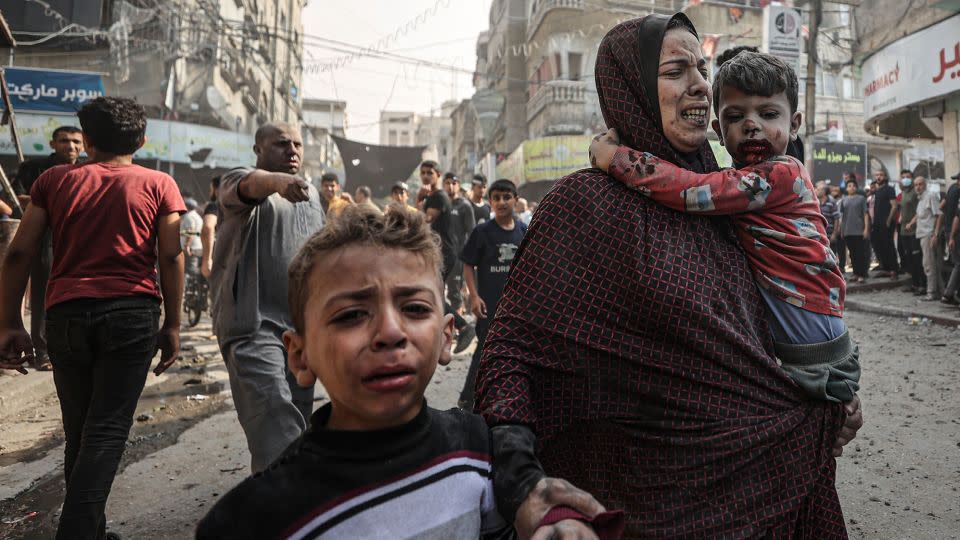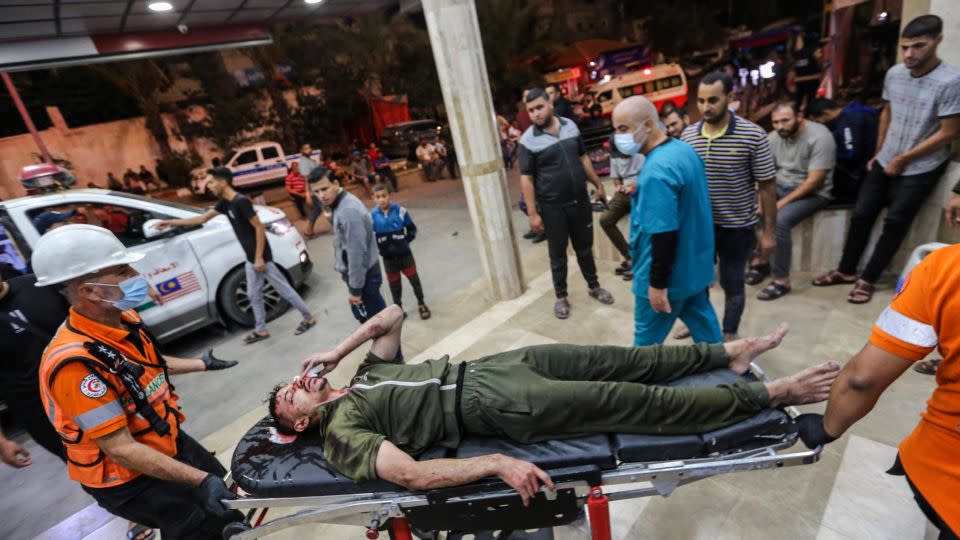Surgery without drugs, patients piling up: Gaza’s hospitals overwhelmed amid Israeli strikes and fuel shortages
In Al-Shifa hospital, Gaza’s largest medical facility, a dazed and drowsy woman sits on the floor with a bleeding leg. A younger man lies flat on blood-stained tiles, his neck and legs wrapped in bandages.
The rest of the emergency room on Tuesday was crowded with men, women and children of different ages – some crying, some trembling and some asleep on makeshift beds on the floor.
“The situation in hospitals is miserable… (it) makes you weep,” Rajaa Musleh, a 50-year-old woman sheltering at Al-Shifa, told CNN on Thursday.
“There is no equipment, people are piled up on top of one another,” said Musleh, who is also Gaza’s country representative for the MedGlobal healthcare charity.
Musleh lost her home in Israel’s bombardment of Gaza and says that soon there won’t be any fuel left to power this hospital, which is housing both patients and the countless displaced who have nowhere else to go.
More than 1.4 million people in Gaza were internally displaced as of Wednesday, according to the United Nations Office for the Coordination of Humanitarian Affairs (OCHA). More than half a million are seeking refuge in facilities run by the UN’s Relief and Works Agency for Palestine Refugees (UNRWA), which are accommodating numbers three times their intended capacity.
Piles of both trash and people line the hospital’s corridors, Musleh said, with many “sleeping on the floors because residents feel hospitals are safe.”
“The smell of death is everywhere,” she said. “The smell of blood is everywhere.”

The Palestinian Ministry of Health in Ramallah warned Wednesday that the medical complex would be out of service in less than 24 hours as it runs out of the fuel needed to power generators.
Located in Gaza City, Al-Shifa hospital is also becoming part of the frontline, as Israel last week claimed that the facility is the site of a major Hamas command and control center.
One of the most densely populated areas on earth, the 140-square-mile Gaza Strip is being pounded by the Israeli military, which seeks to wipe out the Hamas militant group that launched the brutal October 7 attack on Israel, killing 1,400 and kidnapping more than 200 others.
More than 9,000 people have so far been killed in Gaza as a result of Israeli strikes, according to the Ramallah-based Palestinian health ministry, quoting data sourced from within the Hamas-controlled territory. More than 22,000 others have been injured, it said.
‘Overloaded’
Hospital staff are exhausted, Dr. Alaa Shitali, a medical officer at Al-Shifa’s emergency department, told CNN Tuesday.
“You couldn’t, as a human being and a medical officer, bear this situation,” he said, standing in the emergency department, surrounded by patients.
Shitali has not seen his family for days, and has to spend his nights at the hospital to treat the massive crowd of patients constantly flowing in. “We are overloaded,” he said.
Doctors at Al-Shifa are also seeing children with the majority of their body and faces burned, missing limbs and other “catastrophic injuries,” said Dr. Tanya Haj-Hassan, a pediatric intensive care and humanitarian doctor with the aid group Doctors Without Borders, also known as Médecins Sans Frontières.
“And the doctors are left to treat them with limited pain control, (as they are) running out of anesthetic drugs.” she told CNN. “We do not have enough antibiotics to treat wound infections, we don’t have enough dressings.”
The few other remaining hospitals in Gaza are also suffering, with some completely shutting down.
Gaza’s leading cancer hospital, the Turkish-Palestinian Friendship hospital, has stopped operating due to Israeli bombardment and fuel shortages, the Hamas-controlled Ministry of Health said in a statement Wednesday, adding that 16 out of 35 hospitals in Gaza are now shut.
Israel has claimed that there is fuel in Gaza, but that it is under Hamas’ control. CNN cannot independently verify the amount of fuel in the enclave.
The Turkish-Palestinian Friendship hospital was struck by Israel Monday, the hospital director, Sobhi Skaik, told CNN, causing damage to oxygen and water supplies on its third floor. A video circulating on social media and geolocated by CNN showed smoke coming out from the facility’s central building.
Skaik said the “most severe damage is the anxiety and panic that afflicts patients,” adding that some fled the hospital after the airstrike.

The Israeli military told CNN in a statement Tuesday that the Israel Defense Forces (IDF) “did not strike Gaza’s Turkish-Palestinian Friendship hospital.” It did not offer any further information.
In Gaza’s Indonesian hospital, the medical services backbone of the enclave’s northern section, the main generator ran out of power Wednesday, leaving the 16,000-square-meter (172,000-square-foot) facility running on a secondary generator in only some parts of the hospital.
Key systems requiring power – such as ventilation in operating rooms and oxygen stations – have stopped working in the entire hospital, the facility’s director, Dr. Atef Al Kahlout, told CNN, adding that the hospital’s morgue refrigerators have also stopped working.
The Indonesian hospital is the nearest medical facility to the densely populated Jabalya refugee camp in northern Gaza, which the Israeli military hit with airstrikes on both Tuesday and Wednesday, leading to hundreds of casualties – dead and wounded – medics said. The Israeli military said the strikes on Jabalya targeted Hamas commanders and the group’s infrastructure.
Videos seen by CNN on Tuesday showed long lines of bodies outside the hospital.
‘Hanging by a thread’
The strain on hospitals have also taken a toll on vulnerable groups, such as pregnant women and newborn children.
The humanitarian agency Care International warned Monday that the dire medical conditions in the enclave are “exacerbating the risk of maternal and newborn mortality, which are already disproportionately high in Gaza.”

The Geneva-based agency said that pregnant women in Gaza are being forced to undergo emergency C-sections without anesthetics. An average of 160 pregnant women are already expected to give birth every day over the next month in the Gaza Strip, Care International said, adding that there are around 130 newborn infants in incubators that also cannot operate without electricity.
Hospitals in the besieged and heavily battered enclave are “hanging by a thread,” the UN said Monday, adding that around 10 hospitals in Gaza are still operational.
But those facilities are constantly receiving evacuation orders, the UN added.
Dr. Bashar Morad, executive director of the Palestinian Red Crescent and director of the Al-Quds hospital, says that his facility has received several evacuation orders from Israel amid the conflict.
But evacuation is nearly impossible. A healthcare facility in the northern Gaza Strip, Al-Quds receives hundreds of patients wounded amid the shelling, as well as housing displaced Palestinians seeking shelter, Morad told CNN Monday.
Up to 16,000 displaced people are sheltering at Al-Quds, he said, with many living in the building’s corridors as the facility was not built to house such numbers.
Fuel, medical supplies, food and water are diminishing, Morad said, adding that with the vast number of patients as well as those sheltering in the hospital, replenishments are direly needed. But aid has been slow as Israeli military actions separate the strip’s north from the south, he said.
The Palestinian Red Crescent Society said Sunday that Israeli airstrikes have “caused extensive damage to hospital departments and exposed residents and patients to suffocation” at the Al-Quds hospital. The medical organization accused Israel of “deliberately” launching airstrikes “directly next to” the facility in order to force an evacuation of the hospital, the second-largest in Gaza City.
In response to questions from CNN about the strikes, the IDF said in a statement that due to “intensifying hostilities” against Hamas in Gaza City and northern Gaza, the IDF continues to urge civilians to evacuate south.
The airstrike “filled all departments with dust and smoke,” Morad said, causing “panic and fear among women and children.”
Musleh, the woman sheltering at Al-Shifa, described the scenes of dead bodies being hauled out after the airstrikes as “similar to slaughtered animals being moved.”
Bodies in morgues have begun to smell, she said, and many unidentified corpses are being buried in mass graves. “Gaza has been left alone,” Musleh said. “It is being slaughtered from vein to vein.”
CNN’s Kareem El Damanhoury, Kareem Khadder, Gul Tuysuz, Ibrahim Dahman, Paul Murphy, Zeena Saifi and Mohammed Tawfeeq contributed to this report.
For more CNN news and newsletters create an account at CNN.com


